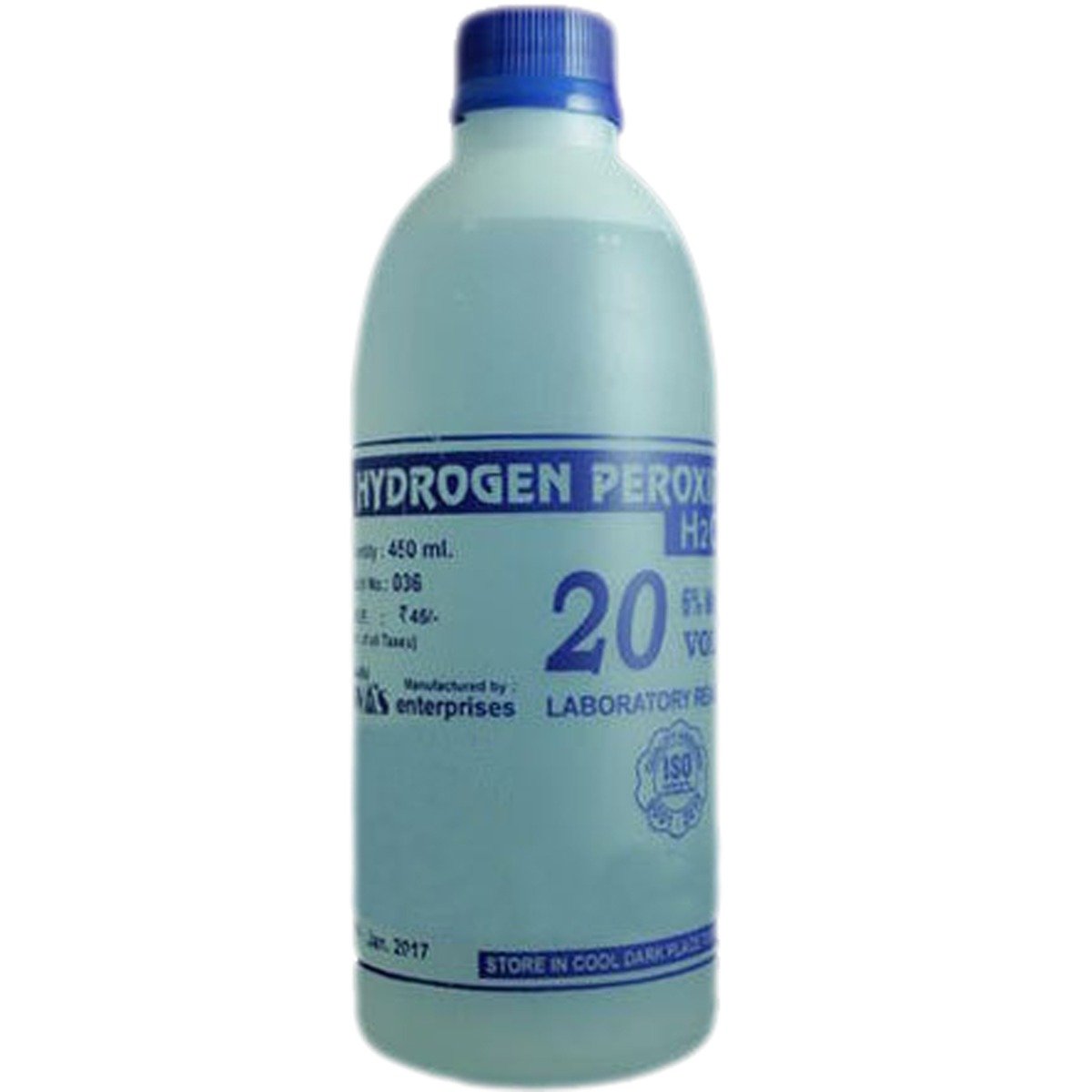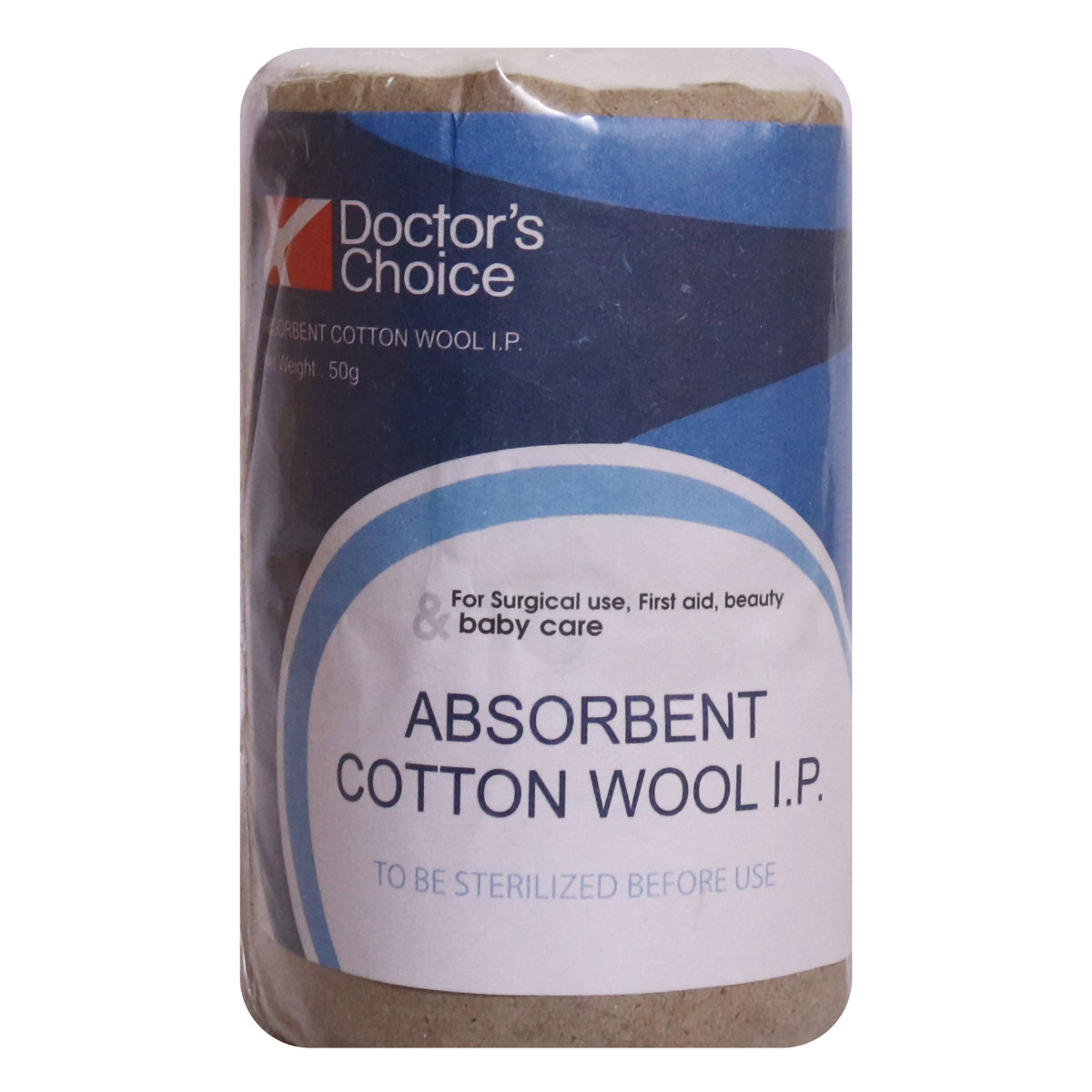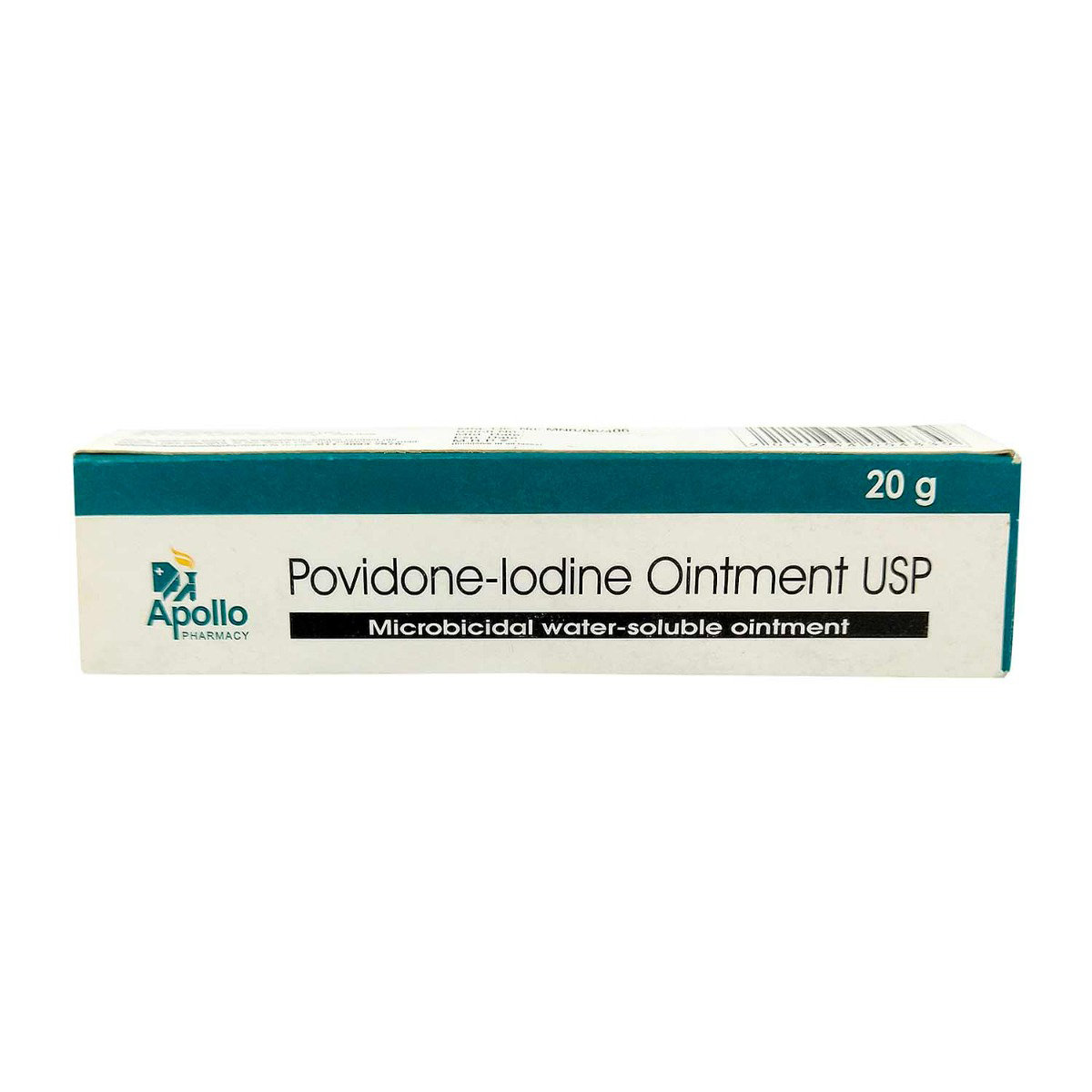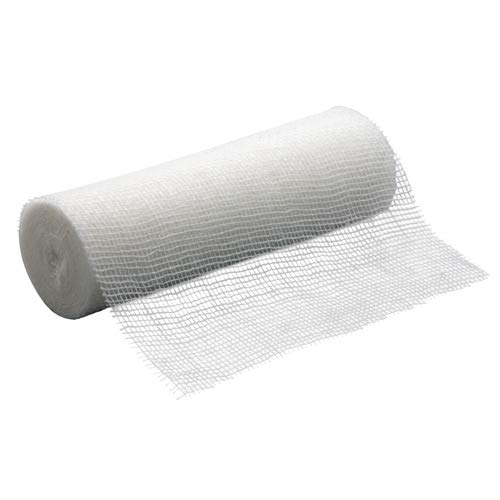Hydrogen Peroxide, 100 ml
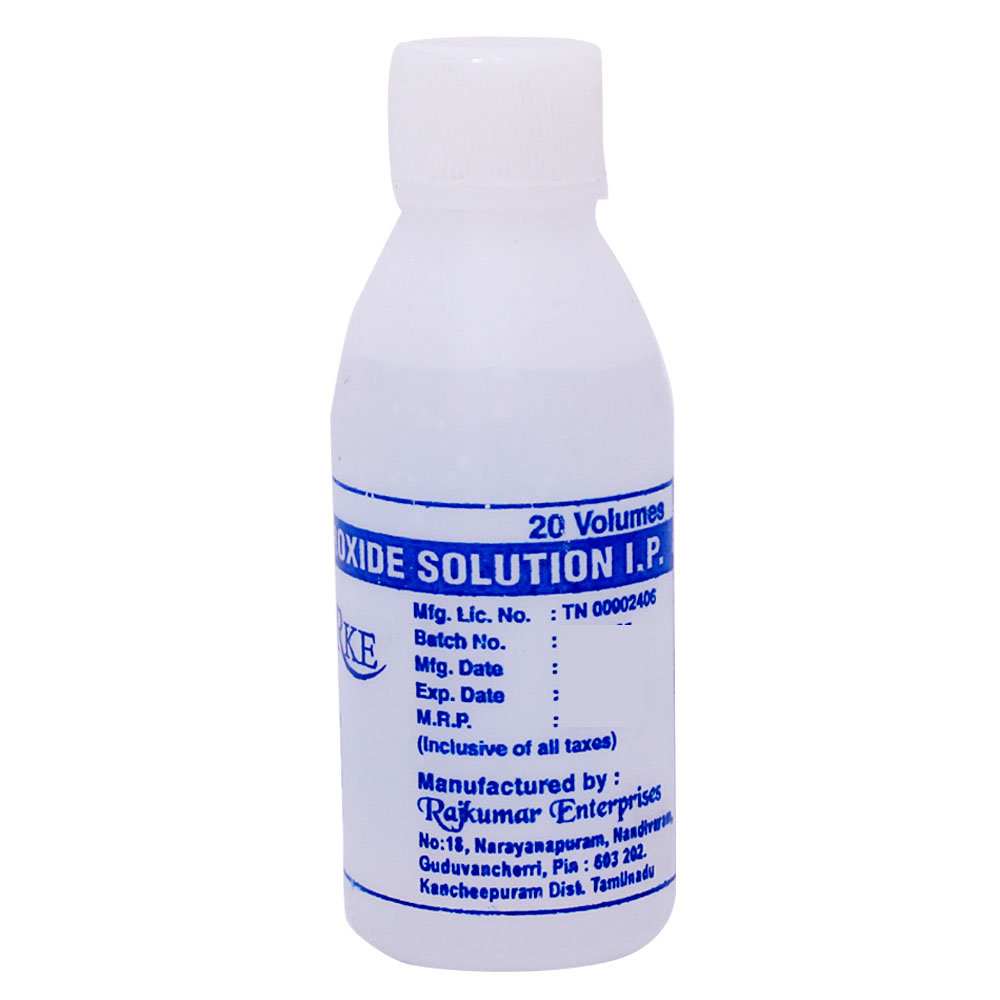
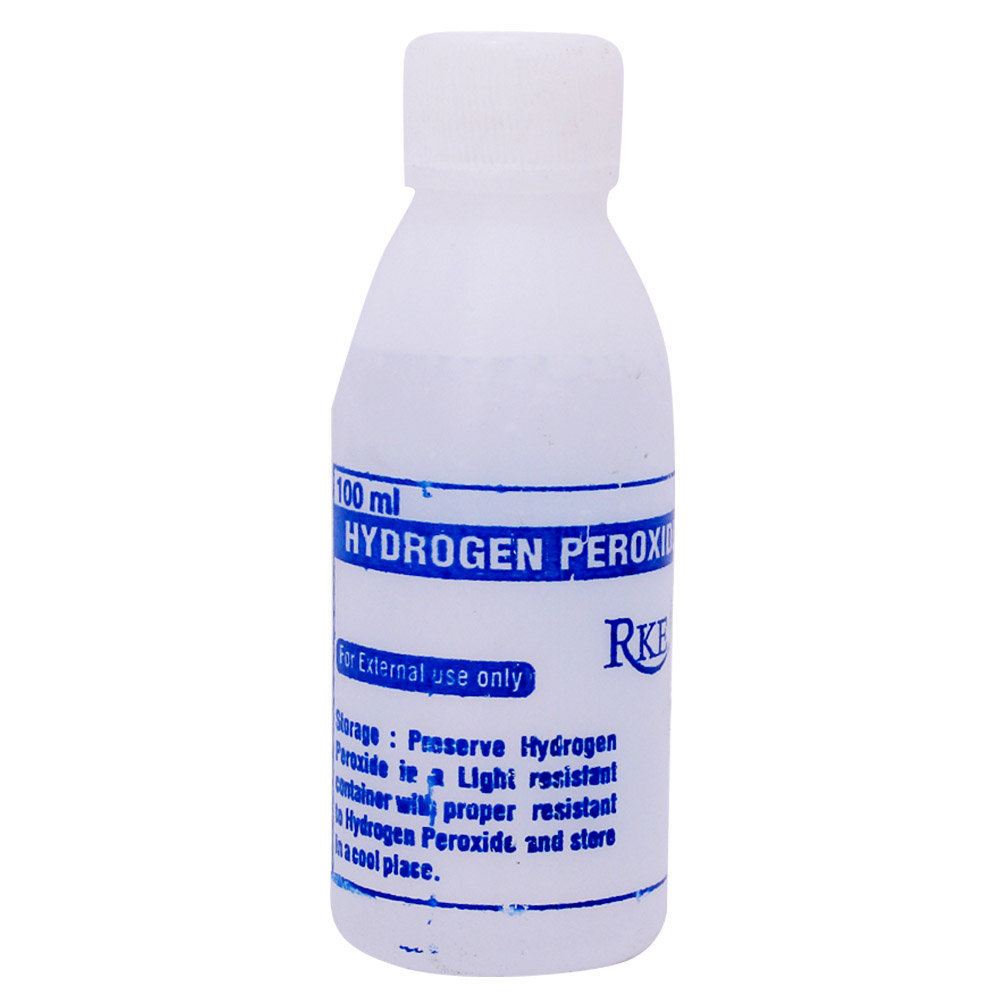
MRP ₹35
(Inclusive of all Taxes)
₹5.3 Cashback (15%)
Hydrogen Peroxide is used in the treatment of topical infections, leg ulcers, and pressure sores. It works by liberating oxygen when applied to the affected area, thus preventing infections occurring due to open scrapes, cuts, and wounds. You may experience common side effects like temporary stinging or redness. This is an external preparation. Hence, avoid contact with the eyes, nose, and mouth.
Know Your Delivery Time
Provide Delivery Location

Secure Payment

India's Most Trusted Pharmacy

Genuine Products
Composition :
Manufacturer/Marketer :
Consume Type :
Return Policy :
Expires on or after :
About Hydrogen Peroxide
Hydrogen Peroxide is used to prevent infections occurring due to open scrapes, cuts, and wounds. Hydrogen Peroxide is also used in the treatment of leg ulcers and pressure sores. Venous ulcers (leg ulcers) are caused by the pooling of blood in the leg veins. Pressure sores are sores caused by lying or sitting in the same position for a long period.
Hydrogen Peroxide contains Hydrogen Peroxide, which works by liberating oxygen when applied to the affected area. The released oxygen froths and foams, helping in cleaning the area of application. Hydrogen Peroxide also functions by producing destructive free radicals of oxygen that attack the pathogen’s cell membrane and DNA, and thus destroy the pathogen and arrest the progression of the disease.
Hydrogen Peroxide should be used as advised by your doctor. It is an external preparation. Hence, avoid contact with the eyes, nose, and mouth. In case of accidental use, wash it thoroughly and inform your doctor. Wash your hands before applying the Hydrogen Peroxide. In some cases, Hydrogen Peroxide may cause certain side effects, such as temporary stinging or redness. Most of these side effects do not require medical attention and will resolve gradually over time. However, you are advised to talk to your physician if you experience these side effects consistently.
Hydrogen Peroxide should be avoided if you are allergic to it or any of its components. Let your doctor know about your entire medical history, including any other topical medications or oral medicines, herbs, or vitamins you may be using. Avoid using Hydrogen Peroxide for more than 3 weeks at a stretch. Do not use Hydrogen Peroxide on large, deep wounds or healthy, intact skin. Hydrogen Peroxide is not meant to be used as an enema or as a laundry detergent. Note that Hydrogen Peroxide may bleach fabrics. Consult your physician before using Hydrogen Peroxide during pregnancy or if you are breastfeeding.
Uses of Hydrogen Peroxide
Hydrogen Peroxide is used in the treatment of Topical infections, Leg ulcers, and Pressure sores. The detailed uses of Hydrogen Peroxide are as follows:
- Topical Treatment for Skin Infections: Helps lessen discomfort, swelling, and redness in cases of bacterial skin infections.
- Wound Care: Used to treat minor burns, scrapes, and cuts to encourage healing and avoid infection.
- Relief from Itching and Irritation: This product can be used to relieve mild irritation and itching brought on by insect bites or skin rashes.

Have a query?
Directions for Use
- Follow your doctor's instructions on the dosage and timing of this medication, to improve effectiveness.
- Apply a small amount of Hydrogen Peroxide to the affected area as suggested by your doctor.
- Wash your hands before applying it.
- It is only for external use.
Medicinal Benefits
Hydrogen Peroxide is a topical agent that has antiseptic, antibacterial, antifungal, and antiviral properties. It contains Hydrogen Peroxide. Hydrogen Peroxide is used to cleanse the area it’s applied to and to prevent any further infection of the open cut, scrape, or wound. Hydrogen Peroxide functions as an antiseptic by virtue of its bacteria and fungus-killing nature. Hydrogen peroxide acts against various bacteria, viruses, fungi, yeast, and spores. Hydrogen Peroxide works by liberating oxygen when applied to the affected area. The released oxygen froths and foams help in cleaning the area of application. Hydrogen Peroxide also shows emulsifying qualities that help its surface action, thereby relieving itching, redness, inflammation, and irritation of the skin. Hydrogen Peroxide is hence used to treat surface-level itches, leg sores, pressure sores, skin breaks, and superficial infections.
How Hydrogen Peroxide Works
Storage
What if I have taken an overdose of Hydrogen Peroxide
Drug Warnings
Inform the physician if you are allergic to Hydrogen Peroxide or any of its components. Discuss your medical history with the doctor, along with any other topical medications, oral medicines, herbs or vitamins you may be using. Avoid using Hydrogen Peroxide for more than three weeks at a stretch. Do not use Hydrogen Peroxide on large, deep wounds or healthy, intact skin. Hydrogen Peroxide is not meant to be used as an enema or as a laundry detergent. Note that Hydrogen Peroxide may bleach fabrics. Consult your physician before using Hydrogen Peroxide during pregnancy or if you are breastfeeding. Avoid wearing tight, and dark-coloured clothing on the affected area after applying Hydrogen Peroxide as Hydrogen Peroxide may bleach fabrics. Avoid getting Hydrogen Peroxide in your eyes and nostrils.
Diet & Lifestyle Advise
- Drinking enough water and keeping your skin hydrated can go a long way in preventing surface infections. While the generally accepted rule is 8-12 glasses of water per day, the trick is to make sure you drink water each time you feel thirsty.
- A diet rich in carbohydrates, proteins, and vitamins can be very effective in promoting wound healing.
- Iron, vitamin C, and zinc supplements can also speed up the wound-healing process.
- Keep your skin moisturized adequately to ensure skin integrity and prevent any skin disease.
- Practising personal hygiene is also very effective in preventing bacterial and fungal surface infections.
- Avoid smoking as this can hamper wound healing and can also predispose to leg ulcers.
- Maintaining a good BMI and moving around and walking can help prevent leg ulcers.
- If you are required to stand for long periods at work, make sure you lie down and raise your leg for a short period at the end of the day to encourage blood circulation.
- Wearing compression stockings can also prove very helpful in maintaining blood circulation.
Habit Forming
Therapeutic Class
RX
Hydrogen Peroxide Solution 450 ml
Unimax Laboratories Pvt Ltd
₹89
(₹0.18/ 1ml)
43% CHEAPER
Alcohol
Caution
No interaction was found. However, it is advisable to avoid or limit the consumption of alcohol as a precautionary measure.
Pregnancy
Consult your doctor
Hydrogen Peroxide is mostly safe to use during pregnancy. However, Hydrogen Peroxide should be used only when a healthcare professional assesses the benefits and risks.
Breast Feeding
Caution
Hydrogen Peroxide is probably safe to use during breastfeeding. However, consult your doctor if you have any concerns.
Driving
Safe
Hydrogen Peroxide does not affect your ability to drive.
Liver
Consult your doctor
Hydrogen Peroxide can be given in case of any liver impairment or problem. However, please consult your doctor if you have any concerns regarding the usage of Hydrogen Peroxide in patients with liver impairment.
Kidney
Consult your doctor
Hydrogen Peroxide can be given in case of any kidney impairment or problem. However, please consult your doctor if you have any concerns regarding the usage of Hydrogen Peroxide in patients with kidney impairment.
Children
Caution
Please consult a child specialist regarding the use of Hydrogen Peroxide in children below 12 years of age.
Heart
Hydrogen Peroxide should be used with caution in patients with heart problems. Please inform your doctor before using it.
Geriatrics
Safe if suggested
Hydrogen Peroxide is generally considered safe for elderly patients when used as suggested by a doctor. Please consult your doctor before using Hydrogen Peroxide.
FAQs
Hydrogen Peroxide belongs to the group of topical antiseptics with antibacterial, antifungal, and antiviral properties. It is used to prevent infections from occurring due to open scrapes, cuts, and wounds.
Hydrogen Peroxide works by exerting an antiseptic effect and killing infection-causing pathogens, thereby relieving the skin of any infection.
Hydrogen Peroxide is suitable for all skin types if recommended. A dry film may appear on the site of application post-application. This is quite normal. It can be removed with a little water. In case of any concerns, you may speak to your dermatologist before using.
It is not advisable to cover the skin with any tight clothing after applying Hydrogen Peroxide. Try to keep it bare for at least some time. Also, Hydrogen Peroxide may bleach fabrics so exercise caution.
Spicy foods, food items with sharp edges, a highly acidic diet, stress, adolescents, and braces or other orthodontic appliances are all risk factors for mouth ulcers.
Country of origin
Manufacturer/Marketer address
Customers Also Bought
Disclaimer
Author Details
We provide you with authentic, trustworthy and relevant information
Reference
- https://mhraproductsprod.blob.core.windows.net/docs-20200302/1604b32f4102b7c93966dea922fd4f77b1e8fdfc
- https://www.webmd.com/drugs/2/drug-76035/hydrogen-peroxide/details
- https://www.weldricks.co.uk/products/crystacide-1-cream-25g
- https://www.medthority.com/drugs/d-dermatologicals/d08/d08a/d08ax/d08ax01/crystacide-cream-1/
- https://www.mayoclinic.org/diseases-conditions/canker-sore/symptoms-causes/syc-20370615#:~:text=Canker%20sores%2C%20also%20called%20aphthous,make%20eating%20and%20talking%20difficult.
- https://www.cdc.gov/infectioncontrol/guidelines/disinfection/disinfection-methods/chemical.html#:~:text=Hydrogen%20peroxide%20works%20by%20producing,and%20other%20essential%20cell%20components.
Buy best Dermatology products by
Others
AYUR
MINTOP
Venusia
UV DOUX
KETO
ELOVERA
NEVLON
TUGAIN
FIXDERMA
ONABET
SELSUN
SOLSET
UVAVO
BETADINE
CANDID
MINOIL
KETAFUNG
MOISTUREX
REJUGLOW
TRICOMAX
TRUDERMA
ACTAME
BIOLINE
CLOCIP
Canesten
DERMADEW
KENZ
KETOMAC
MELALUMIN
OLESOFT
SLC
ZENSOFT
ZORAY
ECOKET
MELAGARD
MORR
NIXIPER
PHOTON
REJUHAIR
SUDERMA
SUNSTOP
AQUASOFT
CIPHANDS
CLINSOL
CUVIA
DEWDERM
DEWSOFT
DUCRAY
DYSIS
EKRAN
KETOL
LOZISOFT
MESODEW
MINOPEP
OILATUM
PARASOFT
PMT
SOLASAFE
SUNBAN
SUNCROS
ACCARE
ACMED
BLYNDS
COSALIC
DANCLEAR
DEPISHINE
Evion
GLAMBAK
GLYMED
HAIRGUARD
Hair Shield
ISDIN
KETOPZ
KTC
KZ
L-SKIN
LACNE
MEDERMA
MEDILICE
PERITOP
PERMED
PHOTOSTABLE
PHYSIOGEL
PSOROLIN
Q-SERA
RITCH
SOFIDEW
SUNMATE
TRIRISE
TVAKSH
ULTRA
UNISON
YUVINIE
A-DERMA
ACNE-UV
ACNESTAL
ACNESTAR
ACNETHRO
ADCROSS
Glenmark Pharmaceuticals Ltd
Canixa Life Sciences Pvt Ltd
Klm Laboratories Pvt Ltd
Sun Pharmaceutical Industries Ltd
Cipla Ltd
Intas Pharmaceuticals Ltd
Abbott India Ltd
Ajanta Pharma Ltd
East West Pharma India Pvt Ltd
Dr Reddy's Laboratories Ltd
Brinton Pharmaceuticals Ltd
Leeford Healthcare Ltd
Alkem Laboratories Ltd
Skinocean Pharmaceuticals
Amwill Healthcare Pvt Ltd
Atopic laboratories Pvt Ltd
Hegde & Hegde Pharmaceutica Llp
Torrent Pharmaceuticals Ltd
Palsons Derma Pvt Ltd
Dermacia Healthcare
Oaknet Healthcare Pvt Ltd
Ipca Laboratories Ltd
Micro Labs Ltd
Yaher Pharma
Med Manor Organics Pvt Ltd
Dermocare Laboratories Gujarat Llp
Apex Laboratories Pvt Ltd
Talent India Pvt Ltd
Kivi Labs Ltd
Mankind Pharma Pvt Ltd
Systopic Laboratories Pvt Ltd
Menarini India Pvt Ltd
Nemus Pharmaceuticals Pvt Ltd
Ethinext Pharma
Zydus Cadila
Regaliz Medicare Ltd
Inex Medicaments Pvt Ltd
Mohrish Pharmaceuticals Pvt Ltd
Hbc Dermiza Healthcare Pvt Ltd
Lupin Ltd
Mrhm Pharma Pvt Ltd
Zydus Healthcare Ltd
Eskon Pharma
GlaxoSmithKline Pharmaceuticals Ltd
La Pristine Bioceuticals Pvt Ltd
Praise Pharma
Wallace Pharmaceuticals Pvt Ltd
Newtrimed Healthcare Pvt Ltd
Biocute Life Care
Glowderma Lab Pvt Ltd
Macleods Pharmaceuticals Ltd
Sol Derma Pharmaceuticals Pvt Ltd
Aurel Biolife
Ethicare Remedies Pvt Ltd
Galcare Pharmaceuticals Pvt Ltd
Kaizen Drugs Pvt Ltd
Percos India Pvt Ltd
Rockmed Pharma Pvt Ltd
Elder Pharmaceuticals Ltd
Rely On Pharmaceuticals
Wockhardt Ltd
Zee Laboratories Ltd
Karlin Pharmaceuticals & Exports Pvt Ltd
Alniche Life Sciences Pvt Ltd
Connote Healthcare
La Med Healthcare Pvt Ltd
Prism Life Sciences Ltd
Yap Bioceuticals
P and P Dermaceuticals Pvt Ltd
Adonis Laboratories Pvt Ltd
Indiabulls Pharmaceuticals Pvt Ltd
Lyra Laboratories Pvt Ltd
Akumentis Healthcare Ltd
Albatross Healthcare Pvt Ltd
Apple Therapeutics Pvt Ltd
Arka Vital Science Pvt Ltd
Gary Pharmaceuticals Pvt Ltd
Rhine Biogenics Pvt Ltd
Yash Pharma Laboratories Pvt Ltd
Dermajoint India
Leogard Pharmaceuticals Pvt Ltd
Dermarex HealthCare India Pvt Ltd
Iceberg Health Care Pvt Ltd
Capital Pharma
Eumedica Pharamceuticals
FDC Ltd
Glasier Wellness Inc
Grace Derma Healthcare Pvt Ltd
Oziel Pharmaceuticals Pvt Ltd
Salve Pharmaceuticals Pvt Ltd
West Coast Pharmaceuticals Pvt Ltd
Entod Pharmaceuticals Ltd
Jenburkt Pharmaceuticals Ltd
Medcure Organics Pvt Ltd
Olcare Laboratories Pvt Ltd
Anhox Healthcare Pvt Ltd
Bioswizz Pharmaceuticals Ltd
Indchemie Health Specialities Pvt Ltd
Omniceutics Healthcare Pvt Ltd
Skinska Pharmaceutica Pvt Ltd
BODY CREAM
Body Lotion
Soap
Face Cream
Shampoo
Sun Screen
Face Gel
Face Wash
HAIR SOLUTION
BODY GEL
Face Serum
Hair Lotion
Hair Serum
Dusting Powder
ANTISEPTIC
Body Wash
Face Lotion
FACE CLEANSER
Body Spray
Foot Cream
Conditioner
Eye Cream
Eye Gel
Cleanser
Hair Cream
Hair Gel
Hair Spray
FUNGAL INFECTION
Hair Oil
Sanitizer
Specialty Supplements
Face Mask
Skin Ointment
Lip Balm
Capsule
Eye Serum
Intimate Wash
Hand Cream
Facial Spray
Face Toner
Hand Wash
SPECIALITY SUPPLEMENT
Tablet
BABY SUNSCREEN
Body Butter
Body Scrub
EYE SOLUTION
FACIAL WIPE
Gargle
Hair Color
Hair Mask
Hair Tonic
Intimate Spray
Lip Serum
VITAMIN D


